-
 Bitcoin
Bitcoin $106,754.6083
1.33% -
 Ethereum
Ethereum $2,625.8249
3.80% -
 Tether USDt
Tether USDt $1.0001
-0.03% -
 XRP
XRP $2.1891
1.67% -
 BNB
BNB $654.5220
0.66% -
 Solana
Solana $156.9428
7.28% -
 USDC
USDC $0.9998
0.00% -
 Dogecoin
Dogecoin $0.1780
1.14% -
 TRON
TRON $0.2706
-0.16% -
 Cardano
Cardano $0.6470
2.77% -
 Hyperliquid
Hyperliquid $44.6467
10.24% -
 Sui
Sui $3.1128
3.86% -
 Bitcoin Cash
Bitcoin Cash $455.7646
3.00% -
 Chainlink
Chainlink $13.6858
4.08% -
 UNUS SED LEO
UNUS SED LEO $9.2682
0.21% -
 Avalanche
Avalanche $19.7433
3.79% -
 Stellar
Stellar $0.2616
1.64% -
 Toncoin
Toncoin $3.0222
2.19% -
 Shiba Inu
Shiba Inu $0.0...01220
1.49% -
 Hedera
Hedera $0.1580
2.75% -
 Litecoin
Litecoin $87.4964
2.29% -
 Polkadot
Polkadot $3.8958
3.05% -
 Ethena USDe
Ethena USDe $1.0000
-0.04% -
 Monero
Monero $317.2263
0.26% -
 Bitget Token
Bitget Token $4.5985
1.68% -
 Dai
Dai $0.9999
0.00% -
 Pepe
Pepe $0.0...01140
2.44% -
 Uniswap
Uniswap $7.6065
5.29% -
 Pi
Pi $0.6042
-2.00% -
 Aave
Aave $289.6343
6.02%
What are the best storage media options for wallet backup?
Cryptocurrency wallet backups demand careful consideration. Hardware wallets offer superior security, while paper wallets provide offline protection but risk physical damage. Software wallets are convenient but vulnerable, and cloud storage is strongly discouraged. The best choice depends on individual needs and technical skills.
Mar 12, 2025 at 03:35 am
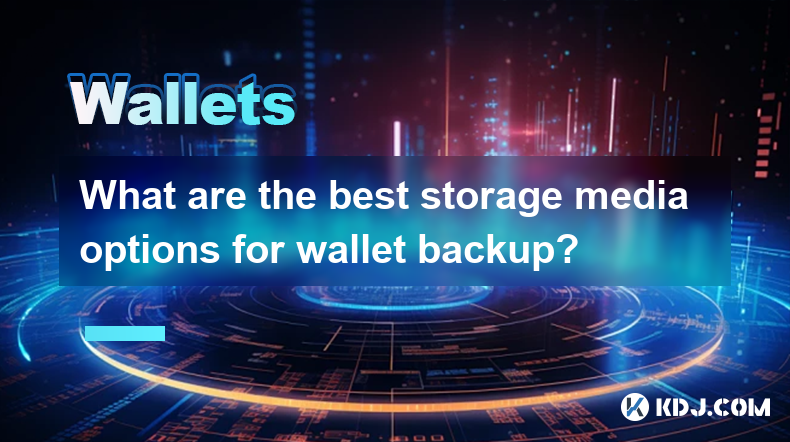
Key Points:
- Hardware Wallets: Offer the highest level of security but require careful handling and understanding.
- Paper Wallets: Provide offline security but are susceptible to physical damage and loss.
- Software Wallets: Convenient but require strong security practices to mitigate risks.
- Cloud Storage (Not Recommended): Highly insecure and should be avoided for storing private keys.
- Choosing the right option depends on your technical skills, security needs, and the amount of cryptocurrency you hold.
What are the best storage media options for wallet backups? This crucial question plagues many cryptocurrency holders. The security of your digital assets hinges on the safety of your wallet backup, containing the crucial private keys needed to access your funds. Choosing the wrong storage method can expose your holdings to theft or loss. Let's explore the various options and their pros and cons.
Hardware Wallets: The Fortress of Security
Hardware wallets are considered the gold standard for cryptocurrency storage. These dedicated devices store your private keys offline, significantly reducing the risk of hacking. They offer a high degree of security due to their isolated environment. However, losing or damaging the device means losing access to your funds, so meticulous record-keeping is crucial. Reputable brands like Ledger and Trezor offer robust hardware wallets with various security features.
Paper Wallets: The Offline Guardian
Paper wallets involve printing your public and private keys onto paper. This offline storage method eliminates the risk of online hacking. However, physical security becomes paramount. Losing the paper, or having it damaged, renders your keys inaccessible. Properly securing the paper wallet, perhaps in a fireproof safe, is crucial. Ensure you use high-quality, tamper-evident paper and follow best practices for generation and printing.
Software Wallets: Convenience with Caveats
Software wallets, installed on your computer or mobile device, offer ease of access and convenience. However, they are more vulnerable to malware and hacking attempts. Robust security practices, such as strong passwords, two-factor authentication, and regular software updates, are essential. Choose reputable software wallets and understand the security implications before using them.
Cloud Storage: A Dangerous Choice
Storing your wallet backup on cloud services is strongly discouraged. Cloud storage providers, while generally secure, are not immune to data breaches. Your private keys, if compromised, could expose your cryptocurrency to theft. Avoid this option entirely, as the risks far outweigh the convenience.
Multiple Backup Strategies: Redundancy is Key
A single backup point is risky. Consider using multiple backup methods. For example, you might store a hardware wallet backup and also create a paper wallet backup as a second layer of protection. This redundancy helps mitigate the risk of losing access to your funds. Remember, the security of your cryptocurrency is paramount.
Choosing the Right Option: A Personalized Approach
The best storage media for your wallet backup depends on several factors:
- Amount of Cryptocurrency: For large holdings, the enhanced security of a hardware wallet is advisable.
- Technical Proficiency: If you're less tech-savvy, a paper wallet might be a simpler option, though it requires careful physical security.
- Risk Tolerance: Your comfort level with different security risks will influence your choice.
Step-by-Step Guide to Creating a Paper Wallet Backup:
- Generate a new wallet address using a reputable online tool or software.
- Print the public and private keys clearly and legibly.
- Verify the printed keys against the digital copy.
- Store the paper wallet in a safe, secure, and offline location.
Step-by-Step Guide to Using a Hardware Wallet:
- Purchase a reputable hardware wallet from a trusted vendor.
- Follow the manufacturer's instructions to set up and secure the device.
- Regularly back up your recovery seed phrase according to the manufacturer's instructions. This seed phrase is crucial for restoring access to your funds.
Frequently Asked Questions:
Q: What is a recovery seed phrase?
A: A recovery seed phrase is a sequence of words that acts as a master key to your cryptocurrency wallet. It allows you to restore access to your funds if your wallet is lost, stolen, or damaged. Keep it secure and never share it with anyone.
Q: How often should I back up my wallet?
A: Back up your wallet regularly, ideally after any significant transaction or software update. The frequency depends on your usage and risk tolerance. For hardware wallets, backing up the recovery seed phrase is crucial and should be done immediately after setup and stored securely in a different location than the device.
Q: Are all hardware wallets created equal?
A: No. Reputable brands like Ledger and Trezor have established reputations for security and reliability. Research thoroughly before purchasing a hardware wallet. Look for features like secure element chips and open-source firmware for increased transparency and security.
Q: What if I lose my paper wallet or hardware wallet?
A: If you lose your paper wallet, your funds are likely lost. If you lose your hardware wallet but have securely stored your recovery seed phrase, you can restore your wallet on a new device. The importance of the seed phrase cannot be overstated.
Q: Can I use a USB drive for backup?
A: While technically possible, using a USB drive is not recommended. USB drives are susceptible to malware and physical damage, making them a less secure option than hardware wallets or paper wallets. They also offer less protection against theft.
Disclaimer:info@kdj.com
The information provided is not trading advice. kdj.com does not assume any responsibility for any investments made based on the information provided in this article. Cryptocurrencies are highly volatile and it is highly recommended that you invest with caution after thorough research!
If you believe that the content used on this website infringes your copyright, please contact us immediately (info@kdj.com) and we will delete it promptly.
- 2025-W Uncirculated American Gold Eagle and Dr. Vera Rubin Quarter Mark New Products
- 2025-06-13 06:25:13
- Ruvi AI (RVU) Leverages Blockchain and Artificial Intelligence to Disrupt Marketing, Entertainment, and Finance
- 2025-06-13 07:05:12
- H100 Group AB Raises 101 Million SEK (Approximately $10.6 Million) to Bolster Bitcoin Reserves
- 2025-06-13 06:25:13
- Galaxy Digital CEO Mike Novogratz Says Bitcoin Will Replace Gold and Go to $1,000,000
- 2025-06-13 06:45:13
- Trust Wallet Token (TWT) Price Drops 5.7% as RWA Integration Plans Ignite Excitement
- 2025-06-13 06:45:13
- Ethereum (ETH) Is in the Second Phase of a Three-Stage Market Cycle
- 2025-06-13 07:25:13
Related knowledge
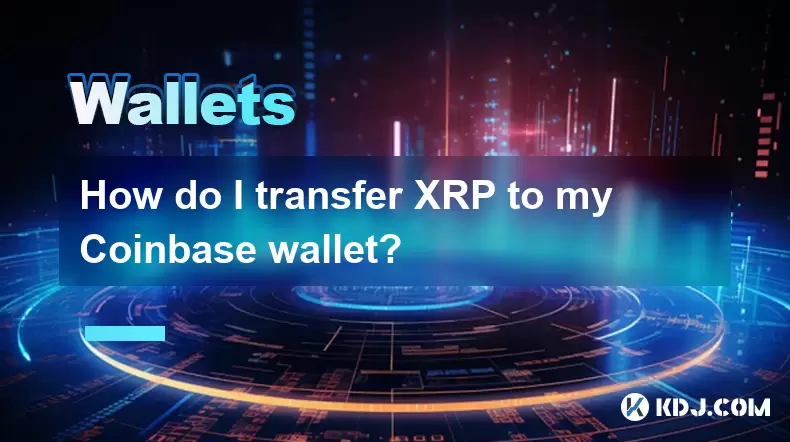
How do I transfer XRP to my Coinbase wallet?
Jun 16,2025 at 04:57pm
Understanding the Basics of XRP and Coinbase CompatibilityBefore initiating any transfer, it’s essential to confirm whether Coinbase supports XRP. As of recent updates, Coinbase has resumed offering XRP trading services on its platform after a period of uncertainty due to legal issues involving Ripple Labs. However, availability may vary depending on yo...

How do I deposit BNB into my Trust Wallet?
Jun 15,2025 at 03:56pm
Understanding BNB and Trust Wallet CompatibilityBefore initiating a deposit, it’s crucial to understand what BNB is and how it interacts with Trust Wallet. BNB (Binance Coin) is a utility token created by the Binance exchange. It can be used for paying transaction fees, participating in token sales, and more. Trust Wallet, on the other hand, is a mobile...
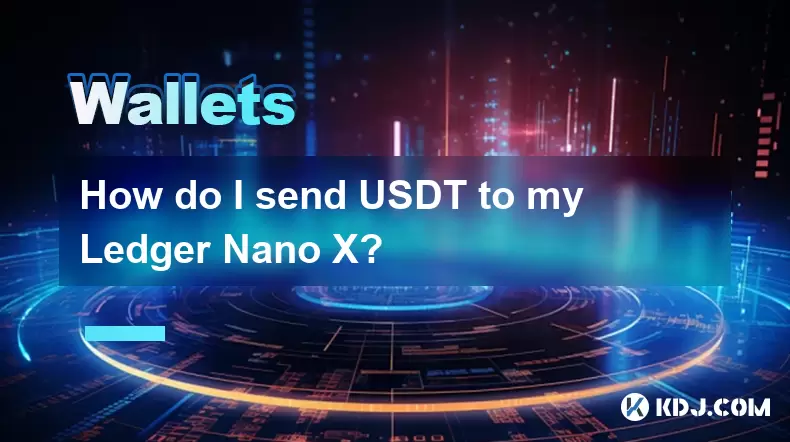
How do I send USDT to my Ledger Nano X?
Jun 15,2025 at 06:28am
What is USDT and Why Use Ledger Nano X?USDT, also known as Tether, is one of the most widely used stablecoins in the cryptocurrency ecosystem. It operates on various blockchain networks such as Ethereum (ERC-20), Tron (TRC-20), and others, offering users a digital asset pegged 1:1 to the US dollar. When it comes to storing USDT securely, hardware wallet...
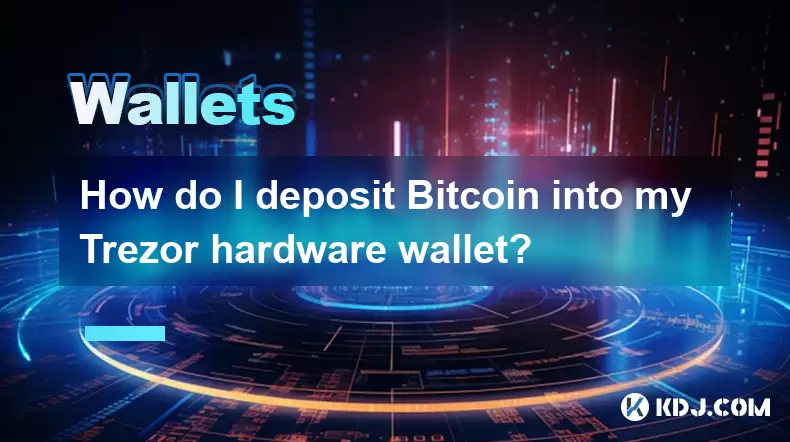
How do I deposit Bitcoin into my Trezor hardware wallet?
Jun 14,2025 at 12:29pm
What is a Trezor Hardware Wallet?A Trezor hardware wallet is a secure device designed to store cryptocurrencies offline, protecting them from online threats. Unlike software wallets, which are vulnerable to hacking and malware, Trezor stores private keys on the physical device itself. This ensures that transactions can only be approved by physically int...
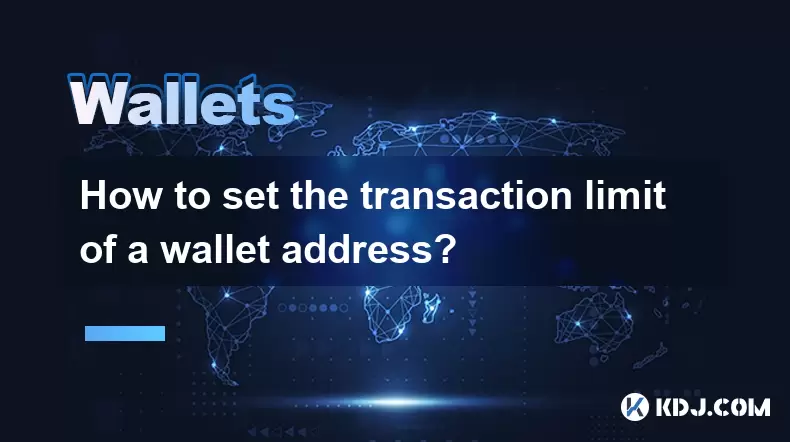
How to set the transaction limit of a wallet address?
Jun 16,2025 at 04:08am
Understanding the Concept of Transaction Limits in Cryptocurrency WalletsIn the cryptocurrency ecosystem, transaction limits refer to predefined restrictions placed on the amount of digital assets that can be sent or received by a wallet address within a specified timeframe. These limits are typically enforced by platforms such as exchanges, custodial w...
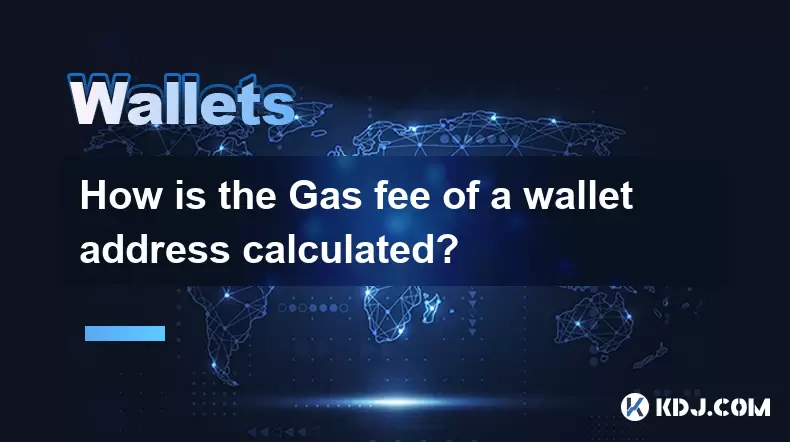
How is the Gas fee of a wallet address calculated?
Jun 14,2025 at 07:57pm
Understanding the Basics of Gas Fees in Blockchain TransactionsIn the cryptocurrency ecosystem, particularly within Ethereum-based networks, a Gas fee is an essential component of executing transactions or smart contract operations. The Gas fee serves as compensation for miners or validators who process and confirm transactions on the blockchain. It is ...

How do I transfer XRP to my Coinbase wallet?
Jun 16,2025 at 04:57pm
Understanding the Basics of XRP and Coinbase CompatibilityBefore initiating any transfer, it’s essential to confirm whether Coinbase supports XRP. As of recent updates, Coinbase has resumed offering XRP trading services on its platform after a period of uncertainty due to legal issues involving Ripple Labs. However, availability may vary depending on yo...

How do I deposit BNB into my Trust Wallet?
Jun 15,2025 at 03:56pm
Understanding BNB and Trust Wallet CompatibilityBefore initiating a deposit, it’s crucial to understand what BNB is and how it interacts with Trust Wallet. BNB (Binance Coin) is a utility token created by the Binance exchange. It can be used for paying transaction fees, participating in token sales, and more. Trust Wallet, on the other hand, is a mobile...

How do I send USDT to my Ledger Nano X?
Jun 15,2025 at 06:28am
What is USDT and Why Use Ledger Nano X?USDT, also known as Tether, is one of the most widely used stablecoins in the cryptocurrency ecosystem. It operates on various blockchain networks such as Ethereum (ERC-20), Tron (TRC-20), and others, offering users a digital asset pegged 1:1 to the US dollar. When it comes to storing USDT securely, hardware wallet...

How do I deposit Bitcoin into my Trezor hardware wallet?
Jun 14,2025 at 12:29pm
What is a Trezor Hardware Wallet?A Trezor hardware wallet is a secure device designed to store cryptocurrencies offline, protecting them from online threats. Unlike software wallets, which are vulnerable to hacking and malware, Trezor stores private keys on the physical device itself. This ensures that transactions can only be approved by physically int...

How to set the transaction limit of a wallet address?
Jun 16,2025 at 04:08am
Understanding the Concept of Transaction Limits in Cryptocurrency WalletsIn the cryptocurrency ecosystem, transaction limits refer to predefined restrictions placed on the amount of digital assets that can be sent or received by a wallet address within a specified timeframe. These limits are typically enforced by platforms such as exchanges, custodial w...

How is the Gas fee of a wallet address calculated?
Jun 14,2025 at 07:57pm
Understanding the Basics of Gas Fees in Blockchain TransactionsIn the cryptocurrency ecosystem, particularly within Ethereum-based networks, a Gas fee is an essential component of executing transactions or smart contract operations. The Gas fee serves as compensation for miners or validators who process and confirm transactions on the blockchain. It is ...
See all articles

























































































